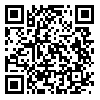Volume 11 - Articles-1400
MEJDS (2021) 11: 103 |
Back to browse issues page
Ethics code: IR.IAU.ARDABIL.REC.1399.048
Download citation:
BibTeX | RIS | EndNote | Medlars | ProCite | Reference Manager | RefWorks
Send citation to:



BibTeX | RIS | EndNote | Medlars | ProCite | Reference Manager | RefWorks
Send citation to:
Zirak S R, Musa Zadeh T, Nazari V. Effects of Acceptance and Commitment Therapy on Emotional Distress and Uncertainty Intolerance in Drug Abusers’ Spouses. MEJDS 2021; 11 :103-103
URL: http://jdisabilstud.org/article-1-2390-en.html
URL: http://jdisabilstud.org/article-1-2390-en.html
1- Department of Psychology, Ardabil Branch, Islamic Azad University
Abstract: (2514 Views)
Background & Objectives: Drug abuse consequences affect numerous individual aspects of human life, such as mood, behavior, cognitive function, social and occupational performance, and marital relationships. Family is the most vulnerable institution in the society to drug abuse; due to dependence, the substance dependent’s caregiver is unable to play their role as the father of the family, the spouses of these people are exposed to serious physical, spiritual, psychological, social; thus, economic damages which despair and disappointment, fear, feeling guilty, suicide, depression, tension, and isolation are main relevant impacts. Therefore, psychological interventions are widely applied for this population and particularly their families. The current study aimed to investigate the effects of Acceptance and Commitment Therapy (ACT) on emotional distress and uncertainty–intolerance in drug abusers’ spouses.
Methods: This was a quasi–experimental study with a pretest–posttest and a control group design. The statistical population included all spouses (women) of drug abusers who were referred to addiction treatment centers in Ardabil City, Iran, in 2020. Using the convenience sampling method, 40 eligible individuals were enrolled in the study and randomly assigned to the experimental and control groups (n=20/group). The inclusion criteria were having no psychological problems and having basic literacy to complete the questionnaires; the exclusion criteria were unwillingness to participate in the study and absence from two intervention sessions. The experimental group received eight 70–minute weekly ACT sessions based on Hayes et al.’s (1999) training package; however, the control group received no intervention. For data collection, the Depression Anxiety Stress Scale (DASS–21; Lovibond & Lovibond, 1995) and Uncertainty Tolerance Scale (Freeston et al., 1994) were used for the pretest and posttest examinations. Descriptive statistical methods, including mean and standard deviation, were applied; inferential statistics, including Multivariate Analysis of Covariance (MANCOVA), t–test, and Chi–squared test were also used in SPSS to analyze the obtained data. The significance level of the tests was considered 0.05.
Results: The present study results suggested that ACT significantly affected emotional distress and uncertainty intolerance. Therefore, this treatment reduced emotional distress components, including stress (p<0.001), anxiety (p<0.001), and depression (p=0.003) and decreased the uncertainty intolerance and its components, including passivity (p<0.001), being stressful (p=0.003), pessimistic (p<0.001), and uncertainty about the future (p<0.001) in the study sample.
Conclusion: The obtained findings indicated that ACT was effective in reducing the emotional distress and uncertainty–intolerance in drug abusers’ spouses. Therefore, family counselors and therapists can use the present study findings for clinical and therapeutic interventions.
Methods: This was a quasi–experimental study with a pretest–posttest and a control group design. The statistical population included all spouses (women) of drug abusers who were referred to addiction treatment centers in Ardabil City, Iran, in 2020. Using the convenience sampling method, 40 eligible individuals were enrolled in the study and randomly assigned to the experimental and control groups (n=20/group). The inclusion criteria were having no psychological problems and having basic literacy to complete the questionnaires; the exclusion criteria were unwillingness to participate in the study and absence from two intervention sessions. The experimental group received eight 70–minute weekly ACT sessions based on Hayes et al.’s (1999) training package; however, the control group received no intervention. For data collection, the Depression Anxiety Stress Scale (DASS–21; Lovibond & Lovibond, 1995) and Uncertainty Tolerance Scale (Freeston et al., 1994) were used for the pretest and posttest examinations. Descriptive statistical methods, including mean and standard deviation, were applied; inferential statistics, including Multivariate Analysis of Covariance (MANCOVA), t–test, and Chi–squared test were also used in SPSS to analyze the obtained data. The significance level of the tests was considered 0.05.
Results: The present study results suggested that ACT significantly affected emotional distress and uncertainty intolerance. Therefore, this treatment reduced emotional distress components, including stress (p<0.001), anxiety (p<0.001), and depression (p=0.003) and decreased the uncertainty intolerance and its components, including passivity (p<0.001), being stressful (p=0.003), pessimistic (p<0.001), and uncertainty about the future (p<0.001) in the study sample.
Conclusion: The obtained findings indicated that ACT was effective in reducing the emotional distress and uncertainty–intolerance in drug abusers’ spouses. Therefore, family counselors and therapists can use the present study findings for clinical and therapeutic interventions.
Type of Study: Original Research Article |
Subject:
Psychology
Send email to the article author
| Rights and permissions | |
 |
This work is licensed under a Creative Commons Attribution-NonCommercial 4.0 International License. |





